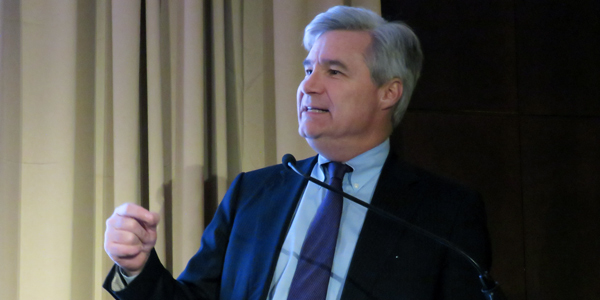By Rich Heidorn Jr.
WASHINGTON — A dozen Senate Republicans are willing to consider a price on carbon emissions but need political cover from business lobbying groups to proceed, Sen. Sheldon Whitehouse (D-R.I.) told the American Council on Renewable Energy (ACORE) Renewable Energy Policy Forum on Wednesday.
Whitehouse spoke to the group the day after giving his 200th floor speech on climate change, or as he put it, “banging my head against the wall of Castle Denial.”
“The day that corporate America steps in on this issue in Congress and does not abandon the field to the fossil fuel industry, you’ll have much more balance. And when that balance happens, it gives running room to Republicans,” said Whitehouse, who has served since 2007. “I will assure you there are at least a dozen Republicans in the Senate who want to work on a carbon bill. … They just don’t want it to be their last political act.”
Seeking ‘Good-Guy Corporations’
Whitehouse said Republicans in Congress won’t move on climate change until “the good-guy corporations” who are expanding their renewable energy purchases and have progressive climate policies put their lobbying muscle behind the effort.
“Even the corporations you think would show up on climate … when they come to Congress, it’s ‘Abandon all hope, ye who enter here,’” Whitehouse said, citing Coca-Cola and Pepsi. “The American Beverage Association, which is their trade association, doesn’t lift a finger on anything related to renewables or climate. Indeed, it funnels money through the [U.S.] Chamber of Commerce, which is probably my most powerful and inveterate adversary on all things renewable and all things climate.”
He also noted that TechNet, the lobbying organization whose members include Apple and Google, has not included climate policy among its legislative priorities. “You look at the policies of Apple, Google, Facebook [and] Microsoft, it’s weird that they would not put climate or even renewable energy into their [lobbying] priority list. It gets even weirder when you look at the rest of the members of TechNet, which includes Sunrun, Bloom Energy [and] SolarCity. They are actually in the green energy business and they have not been able to get green energy into their own trade association’s list of priorities.”
Although some oil company CEOs have said “‘we take climate change seriously; we know that our product is causing it and we support a carbon price’ … their entire legislative apparatus is still fully dedicated to making sure that none of that stuff [passes] Congress,” Whitehouse continued.
He said he is cautiously encouraged by news that the four oil majors are considering supporting a $40/ton price on emitted carbon.
“That’s only 10 bucks away from where my bill is. That’s within negotiating range. Now I’m ready to talk, if we can start to get something done. But they have to be serious about it,” he said. “I’ve got to see [the American Petroleum Institute] move. I’ve got to see the U.S. Chamber move. I’ve got to see their political apparatus get into alignment with their CEOs’ statements.”
Litigation over climate change is putting increasing pressure on corporations, he said. “As the lawsuits pile up and as discovery begins to become more of a threat, as security regulators begin to say, ‘Hey, wait a minute. These reserves you’re reporting: let’s measure them against 2 degrees centigrade or 1.5 degrees and see how real they really are.’”
He told his audience to take “full advantage” of court rulings supporting a social cost of carbon. “Under the Trump administration, they’re not going to want to look at that. But there are three circuit courts of appeal and probably a dozen district courts — as well as a number of administrative agencies, both state and federal — that have said: ‘Look, when you’re dealing with these energy questions, if you haven’t baked the social cost of carbon pollution into your analysis, you are not meeting the standard of basing your decision on substantial evidence and avoiding decisions that are arbitrary and capricious.’” (See related story, Dem Dissents Show FERC Divide on Carbon.)
To be acceptable to Republicans, Whitehouse said, carbon legislation must be based on a market-based price, be revenue-neutral and “border adjustable, so the cement plant in Texas doesn’t have to compete unfairly with a cement plant in Mexico.”
“There’s nothing about this that is inherently partisan,” he said. “The partisanship is a feature of the manner in which the fossil fuel industry deploys its political forces.”
He acknowledged that carbon legislation will be a tougher sell among House GOP members, who face re-election every two years and, he said, are more dependent on party leadership for campaign funds.
Heather Reams, managing director of Citizens for Responsible Energy Solutions, which is seeking to build Republican support for what it calls “common-sense, conservative solutions” on energy, agreed.
“We’ve got to meet [House] members where they are,” she said, speaking on a panel earlier in the day. “We’ve got to recognize we can’t go in with a one-size-fits-all message and say, ‘Here you go.’ … That’s not going to work in the House.”
She called for what she called “storytelling.”
“This is not [just] a renewable business or clean energy [story]. It is business. It is a massive part of our economy. It’s growing rapidly. Why do you want to abandon that?”






